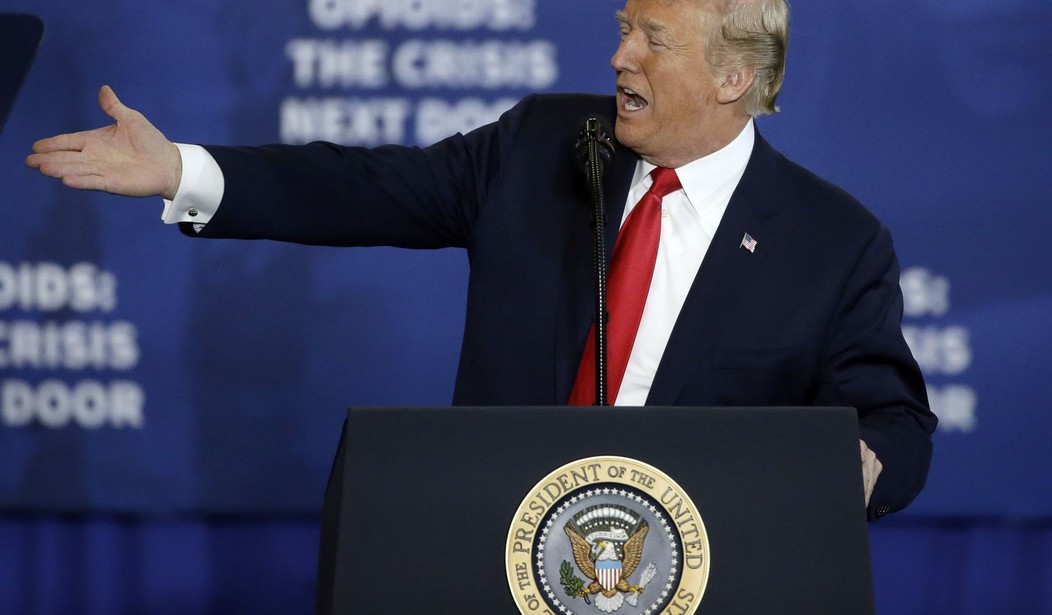During a visit to New Hampshire on Monday, Donald Trump gave a 19-minute speech about opioid abuse in which he used the word tough or variations of it 19 times, more than four times as often as he used the word smart. That ratio seems about right, given the details of the president's plan to end "this scourge of drug addiction in America" and "raise a drug-free generation of American children."
Trump's plan is heavy on tactics that have already failed. For instance, he favors "spending a lot of money" on "very, very bad commercials" that will "scare" kids away from drugs by depicting "pretty unsavory situations."
Trump does not seem to realize that the federal government already tried that, and the results were disappointing. Evaluations found that the taxpayer-financed propaganda did not make teenagers less likely to try drugs and may even have had the opposite effect.
Trump's supply-side ideas are equally innovative. "We have got to get tough," he said, and toughness requires "the death penalty for the really bad pushers and abusers."
The president's fixation on killing drug dealers is little more than a bloodthirsty fantasy. Congress approved execution of large-scale drug traffickers back in 1994, but the provision has never been carried out and probably never will, since the Supreme Court has said the Eighth Amendment requires that the death penalty be reserved for "crimes that take the life of the victim."
Trump also wants to reduce the weight thresholds for mandatory minimum sentences in opioid cases, which is more constitutionally feasible than copying Iran's drug penalties but no more likely to affect the drug supply. As every tough drug warrior who has preceded Trump during the last century has discovered, the economic incentives created by prohibition mean there are always more dealers to replace the ones behind bars.
Recommended
Those same incentives spell doom for Trump's plan to "keep the damn drugs out" by building a "big, beautiful wall" along the border with Mexico. Drug smugglers attracted by prohibition profits will always find ways around, over, under or through any wall, no matter how big or beautiful.
Trump bragged that U.S. Customs and Border Protection "seized nearly 1,500 pounds of fentanyl last year, nearly three times the amount seized in 2016." Since CBP will never manage to intercept more than a small percentage of incoming drugs, rising seizures are a sign of failure, not success, especially when they are accompanied by falling retail prices.
The government has more control over the supply of legally produced opioids, which are subject to quotas set by the Drug Enforcement Administration and regulation of the doctors who prescribe them. "We're going to cut nationwide opioid prescriptions by one-third over the next three years," Trump said.
That strategy does not seem very promising, given that opioid-related deaths mainly involve heroin and illegally produced fentanyl. According to the U.S. Centers for Disease Control and Prevention, the number of opioid prescriptions fell by 16 percent from 2012 to 2016, while the number of opioid-related deaths rose by 82 percent.
Restricting the supply of pain pills contributes to that death toll by driving nonmedical users into the black market, where the drugs are more dangerous because purity and potency are unpredictable. The pressure to reduce prescriptions also hurts legitimate pain patients, who are left in agony when their doctors arbitrarily decrease their doses or cut them off entirely.
The Trump administration reportedly wants to impose the CDC's opioid prescribing guidelines, which encourage doctors to be as stingy as possible with pain pills, on patients covered by Medicaid or Medicare. That will mean more unnecessary suffering for innocent people deprived of the medication they need to have a decent quality of life.
Attorney General Jeff Sessions thinks victims of the crackdown on pain pills should "take some aspirin" and "tough it out." Like his boss, he does not seem to realize there are some problems toughness cannot solve.

























Join the conversation as a VIP Member